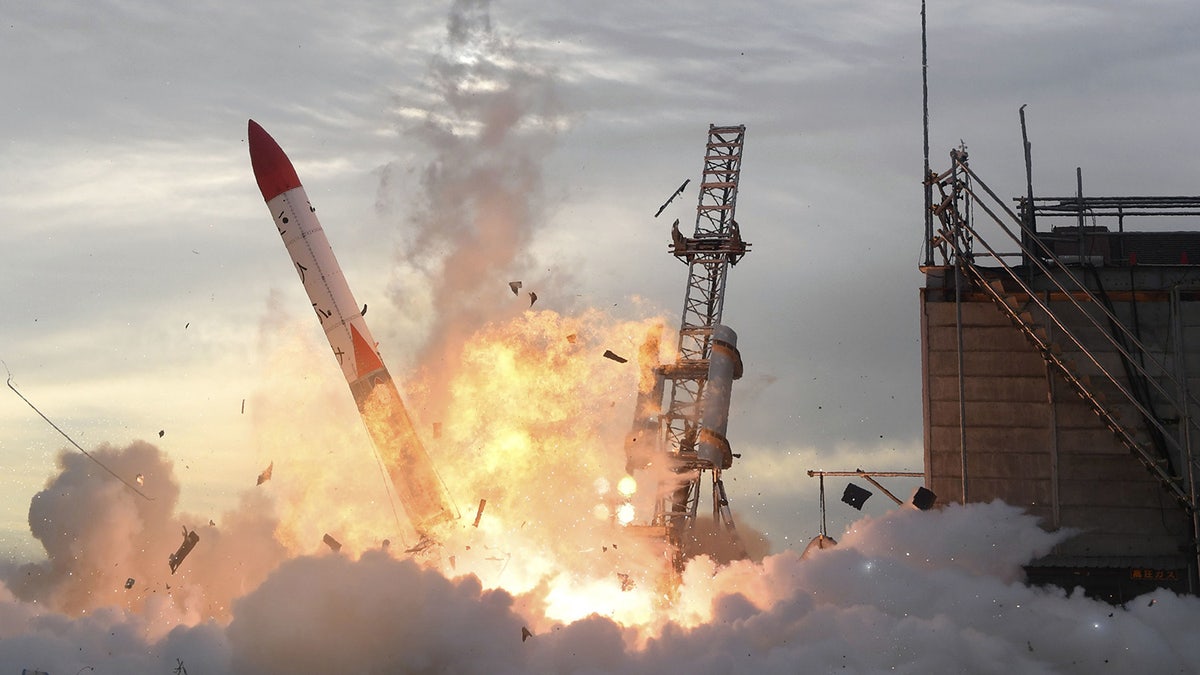
A private Japanese rocket bursts into flames as it crashes to Earth after a failed launch attempt in Taiki, a town on Japan's northernmost island of Hokkaido, on June 30, 2018. The rocket, Momo-2, would have been the first privately built Japanese rocket to reach outer space. (Kyodo News/Getty)
A private Japanese rocket crashed to Earth in a fiery explosion on Saturday (June 30) just moments after lifting off from a test site near the town of Taiki on Japan's northern island of Hokkaido.
This was the second failed launch attempt for the startup Interstellar Technologies, which became the first Japanese company to launch a privately funded space rocket 11 months ago, on July 30, 2017. Its first rocket, Momo-1, crashed into the ocean after losing contact with flight controllers about 70 seconds after liftoff, The Japan Times reported.
Its second mission, Momo-2, went out with more of a bang. After lifting off at 5:30 a.m. local time on June 30 (8:30 p.m. GMT on June 29), the uncrewed rocket had barely left the launchpad before it lost its upward thrust and succumbed to gravity, smashing back down onto the launchpad after less than 10 seconds of flight. [Why Do Rockets Explode?]
Interstellar Technologies President Takahiro Inagawa told reporters that Momo-2 lost thrust 4 seconds after liftoff and that a glitch with the rocket's main engine was likely to blame, according to The Japan Times. The rocket was originally scheduled to launch in April, but the mission was delayed when engineers discovered a nitrogen leak.
More From Space.com
"We have never seen a failure like this," Takafumi Horie, founder of Interstellar Technologies, told reporters, according to the Japanese newspaper The Asahi Shimbun. "We are thinking about what we can do to maintain some tie to the next step even as the future remains barely visible."
The Asahi Shimbun reported that there were no injuries from the accident. However, employees watching the launch about one-third of a mile (0.6 kilometers) from the pad were ordered to evacuate after the explosion.
The Momo rocket is a small launch vehicle designed to lower the cost of launching satellites into space. It stands 33 feet (10 meters) tall and weighs about 1 metric ton. For contrast, SpaceX's Falcon 9 rocket is about as tall as seven Momo rockets and weighs more than 540 tons. However, a Momo rocket launch costs only $440,000, compared with the $50 million it costs to launch a Falcon 9.
Interstellar Technologies, which was founded in 2003, hopes to begin launching small satellites into orbit by 2020. While a second launch failure might force the company to push back that goal, Inagawa remained optimistic.
"We could not accomplish what we were expected to do. I feel sorry for that," Inagawa said at a news conference. "I feel that I would like to keep giving it a shot."
Original article on Space.com.








































